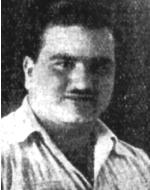Levi Yitzhak
Son of Hatun and Yosef, was born on the 29th of Adar 1929 in Baghdad, the capital of Iraq. Along with his studies in elementary school he learned Hebrew, absorbed the spirit of Zionist pioneering and fulfillment and prepared himself for immigration to Israel. At the end of 1945, he arrived in Israel, crossing the desert with Bedouin shepherds, dressed in the clothes of an Arab boy. Upon his arrival in Israel, he was sent to Kibbutz Maoz Hayim in the Beit She’an Valley. From there he was transferred to Kibbutz Galil Yam, together with a group of Iraqi youth. Yitzhak did a great job there in his work. He loved nature and work in the field, and the kibbutz man testified that his productivity was twice that of any other boy his age. Isaac was tall and strong, with cheerful eyes, courage, seriousness and childish naivete, and he quickly liked all his knowledge, especially the children, who would occasionally prepare new toys for them. Was the center of the group and its living spirit. During the search for illegal weapons in Shefayim, the British were arrested. After a year in the Galilee, he joined his brother Shaul, who was working at Kibbutz Gesher, and together with a group of young people from their town set out to establish a new settlement in the Negev – Nevatim near Beer Sheva – and settle there. Six months later he was forced to leave his friends and come to his parents’ aid in Tel Aviv. During the day he worked in a metal workshop and in the evenings he studied at the Max Payne School and was active in Hanoar Haoved. Immediately after the outbreak of the War of Independence following the United Nations General Assembly resolution of 29 November 1947 on the partition of the land, he left his home and work and went to the defense of the suburbs of Tel Aviv – Manshiya, Hatikva neighborhood and Shapira neighborhood – (28.2.1948), he left with the Haganah unit of the Kiryati Brigade to carry out a sabotage operation in the village of Salameh, the unit encountered an enemy force that was many times its size, and in the ensuing battle Yitzhak fell with several of his comrades. Two days later, the bodies were taken out by the British and brought to rest in the Nahalat Yitzhak military cemetery.
